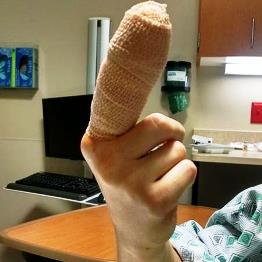Rethinking Anxiety’s Role in a Crisis
Over the weekend, my wife was bitten by a dog. It was a serious bite, costing her the tip of her right index finger. I was present when it happened, watching in horror as she stepped in between two angry lab-mixes that were fighting over a bone.
We went from watching college football to panic in less than 30 seconds. As my wife sat down, holding her bloody hand, there wasn't time to think about much. My only concern was how to help her. My mother-in-law had separated the dogs, placing one in a cage, and raced over with napkins and began to apply pressure to my wife’s wound. At that moment, we had no idea how serious the injury was.
Medical Emergencies and Anxiety
When it comes to the physical properties of anxiety, I am not an expert. I cannot tell you for certain the reason I was able to scoop up my wife, place her in our car, and rush her to the nearest emergency room without a moment’s hesitation was due to adrenaline. Blood, hospitals, loud noises, and confusion are all anxiety triggers for me and I can tell you they didn't slow me down for even a second.
 From the moment we left my brother-in-law’s house to the moment I brought her safely home, anxiety played no role. Whatever part of my brain processes anxiety was shut off and the parts ensuring that she had everything she needed were operating at stunning efficiency. Is it possible that medical emergencies and anxiety aren't compatible? When a loved one is in danger, does the brain bypass the minefield of anxiety triggers and just focus its energy on providing care?
From the moment we left my brother-in-law’s house to the moment I brought her safely home, anxiety played no role. Whatever part of my brain processes anxiety was shut off and the parts ensuring that she had everything she needed were operating at stunning efficiency. Is it possible that medical emergencies and anxiety aren't compatible? When a loved one is in danger, does the brain bypass the minefield of anxiety triggers and just focus its energy on providing care?
Anxiety Always Surfaces
My wife is a fantastic person and she does understand that having bipolar and anxiety disorders presents me with some limitations. She is stunned, however, at how perfect I was during this emergency. The number of things that should have triggered me, but didn’t, astounded her. My mother-in-law, a woman with no history of anxiety or any mental illness, was having a difficult time. During the entire ordeal, I was steady as a rock. For the first time in my entire life, I was described as unflappable.
However, anxiety always surfaces. After we were settled in our home, with my wife resting comfortably and me showered and in my favorite pajamas, the events of the day started to resurface in my mind. Each detail rapidly came to the surface and brought along the anxiety it so conveniently left behind earlier in the day.
The anxiety and panic attack that evening brought along paranoia, racing thoughts, and insomnia. It was a horrible thing to experience and, like all anxiety attacks, took its toll on me emotionally and physically.
Living with generalized anxiety is not easy. It prevents me from doing things I want to do and constantly pops up at inconvenient times. Amidst all of the chaos of this event, there was a silver lining. Being able to be there for my wife when she needed me, in spite of anxiety, is something I will always celebrate.
You can find Gabe on Facebook, Twitter, Google+, LinkedIn, and his website.
APA Reference
Howard, G.
(2014, September 2). Rethinking Anxiety’s Role in a Crisis, HealthyPlace. Retrieved
on 2026, January 19 from https://www.healthyplace.com/blogs/anxiety-schmanxiety/2014/09/rethinking-anxietys-role-crisis
Author: Gabe Howard
I to have Generalized Anxiety Disorder. I have found that although I have anxiety about many things, catastrophic thinking, worry and fear I am great in actual emergencies. As a Physiologist, I understand that my constant anxiety does cause me to run my "fight or flight" hormones more than is ideal, it is no where near the release that happens in a true emergency. Adrenaline, Epinephrine and Norepinephrine are released in an emergency such as your recent experience with the dog bite on your wife's finger. These hormones are ideal for the situation, causing you to think clearly, see things in a logical progression, take action despite things that may normally cause anxiety (such as blood). Now I have seen people that have such a strong reaction to seeing blood that they faint/pass out despite the need to help in an emergency, so it isn't fool proof. I am glad you were able to help your wife and handle the situation! I too find that the anxiety comes later, when my brain begins to think of all the things that "could have gone wrong" or "how much worse it could have been" but that is why I have Ativan, meditation and diaphragmatic breathing to get me through! Take care!
Thank you, Leslie. :) You are right, nothing is fool proof. :) I am glad you are reading and commenting! ~Gabe :)